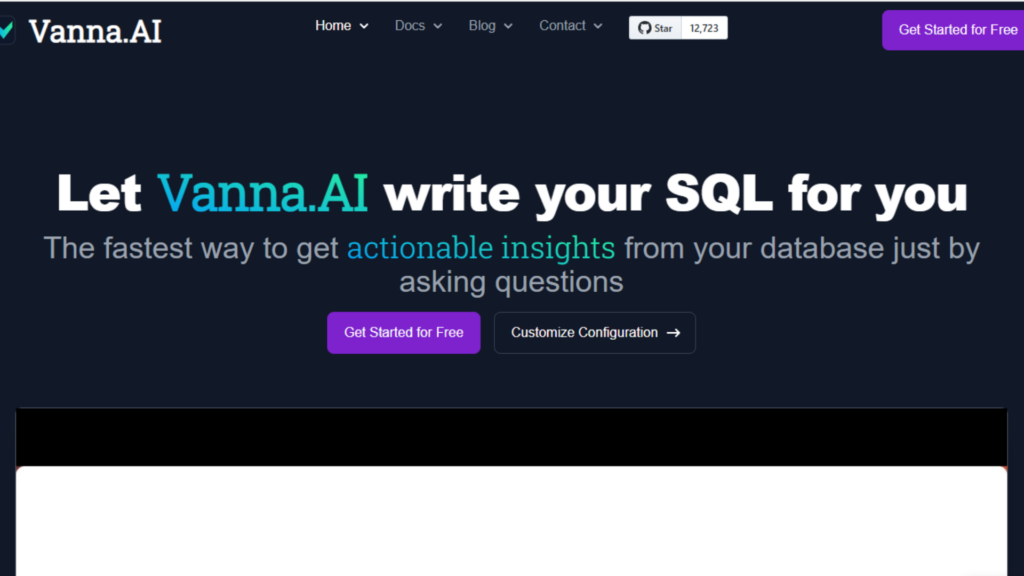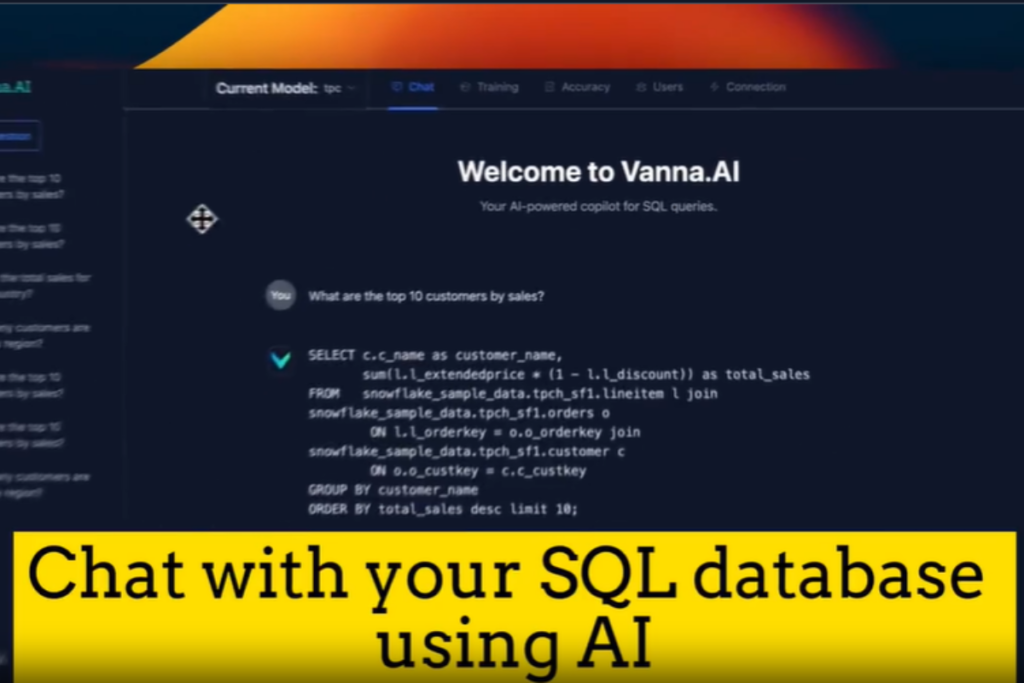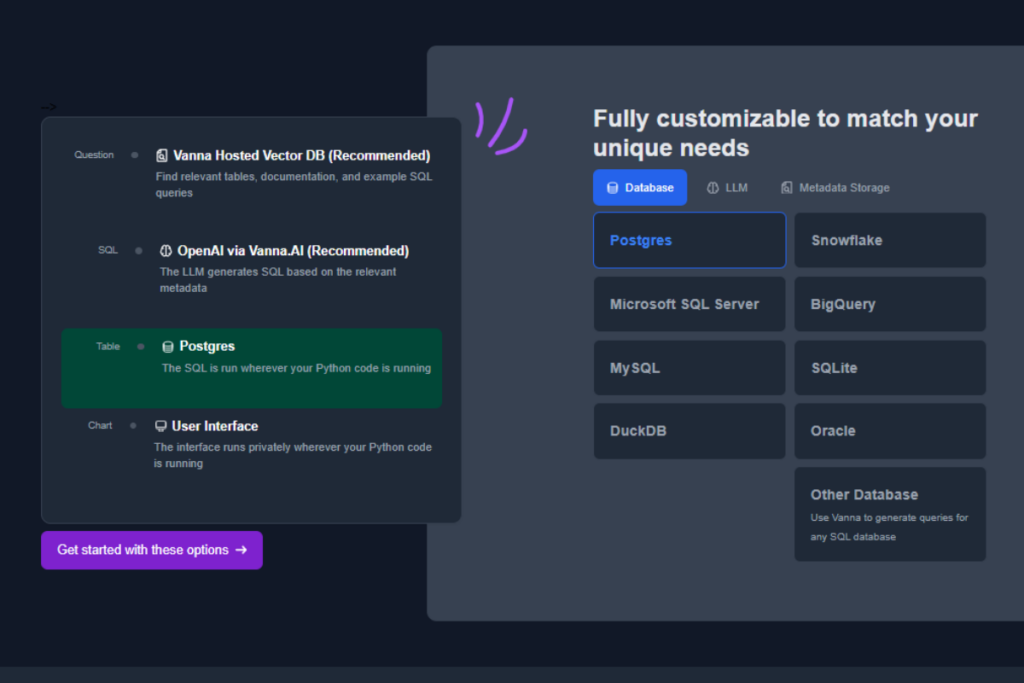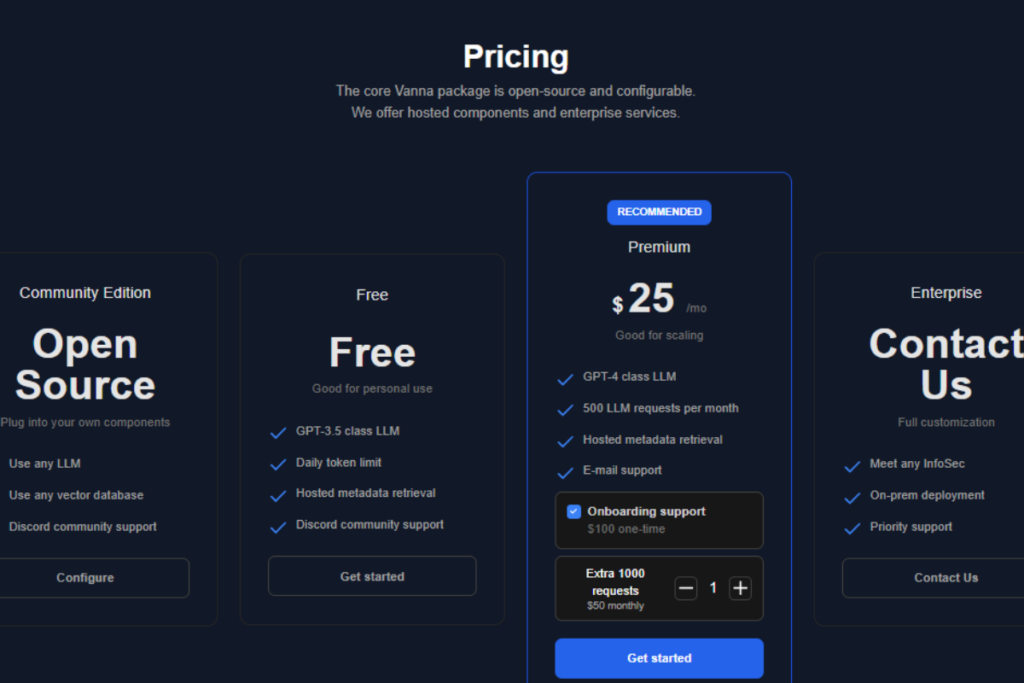Handling data efficiently is a priority for businesses and professionals who rely on insights for decision-making. Yet, not everyone is well-versed in SQL, making it difficult to extract meaningful information from databases.
Vanna AI bridges this gap by converting natural language queries into SQL, making data accessible without requiring advanced technical skills.

This open-source Python package connects with databases such as Snowflake, BigQuery, and PostgreSQL, streamlining users’ interactions with data. It learns from each query, improving accuracy over time to align with specific datasets.
In this review, I will explore its capabilities, setup process, and overall performance. By the end, you’ll have a clear understanding of how Vanna AI can simplify database interactions and improve efficiency in data analysis.
What is Vanna AI?

Vanna AI is an open-source Python package that converts plain language queries into SQL, allowing users to extract data without technical expertise. It simplifies database interactions, making it possible for professionals across different fields to retrieve information without manually writing complex queries.
The tool works with databases such as Snowflake, BigQuery, and PostgreSQL, making data more accessible for decision-making.
Core Functionality and Purpose
Vanna AI acts as a bridge between natural language and structured database queries. Users enter their questions in plain English, and the tool translates them into SQL, retrieving relevant data. This reduces reliance on data teams and speeds up access to insights.
One of its key features is self-learning. Over time, the tool adapts to the data it interacts with, improving accuracy with each query. Its lightweight structure makes it easy to integrate into existing systems without significant setup time.
Who is Vanna AI Designed For?
This tool is valuable for various industries and teams that rely on data insights:
- Business Intelligence Teams – Provides quick access to data without requiring SQL knowledge.
- Product Managers – Helps track product performance and user behavior.
- Marketing Analysts – Allows campaign tracking and customer segmentation with minimal technical effort.
- Sales and Operations Teams – Delivers real-time access to information, improving forecasts and efficiency.
- Small and Medium-Sized Businesses (SMBs) – Supports non-technical teams by offering an easy way to analyze data without hiring database experts.
Key Features and Benefits
- SQL Generation from Plain Language – Converts user queries into structured database searches.
- Self-Learning Mechanism – Improves accuracy over time based on usage.
- Seamless Integration with Databases – Connects with major platforms like Snowflake, BigQuery, and PostgreSQL.
- Open-Source and Customizable – Provides flexibility for businesses to modify and adapt as needed.
- Time-Saving and Cost-Effective – Reduces the need for technical teams to extract data, allowing faster access to insights.
Vanna AI is well-suited for teams looking to improve efficiency when working with databases. Turning text-based queries into SQL removes technical barriers and makes data more accessible to professionals across different roles.
Vanna AI Pros and Cons
Vanna AI allows users to work with databases without needing advanced SQL knowledge. It improves accessibility for those who rely on data-driven decisions while reducing the need for technical expertise. While it offers multiple advantages, certain factors must be considered.
Pros
- Transforms Text-Based Queries into SQL – Users can retrieve information using natural language instead of writing complex queries.
- Adapts to User Data Over Time – Learns from past interactions, improving accuracy with continued use.
- Open-Source and Customizable – This can be adjusted based on specific business needs, offering flexibility for different workflows.
- Works with Leading Databases—It supports Snowflake, BigQuery, and PostgreSQL, making it compatible with widely used platforms.
- Minimizes Dependence on Technical Teams – Non-technical users can access and analyze data without needing specialized knowledge.
Cons
- May Require Some Learning for Best Results – While it simplifies SQL generation, refining queries for complex needs might take time.
- Limited to Certain Database Platforms – Businesses using unsupported systems may not be able to integrate it into their workflow.
- Accuracy Improves with Usage – The tool refines its responses based on past queries, meaning initial results may require adjustments.
Vanna AI helps bridge the gap between technical and non-technical teams, making data analysis more accessible. Understanding its capabilities and potential limitations can help determine if it fits specific business needs.
Vanna AI Expert Opinion & Deep Dive
After testing multiple AI-powered SQL generators, Vanna AI stands out for its flexibility, learning ability, and open-source nature.
Unlike proprietary analytics tools or AI-driven SQL assistants that work on a fixed set of rules, Vanna AI continuously improves based on user interactions.
Strengths of Vanna AI
Vanna AI translates natural language into SQL, allowing users to retrieve information without writing queries manually. This feature makes it useful for teams that work with data but lack SQL expertise.
One of its strongest aspects is its learning system. Over time, it refines its understanding of database structures, leading to more accurate results. Many AI-based SQL tools provide quick answers but struggle with custom datasets. Vanna AI addresses this by improving accuracy the more it is used.
Another major advantage is that it is open-source, giving businesses full control over modifications and integration. Unlike subscription-based SQL generators that charge based on usage, Vanna AI allows teams to build on top of its existing framework without vendor restrictions.
Limitations of Vanna AI
While it reduces the need for manual SQL coding, some understanding of database structures is still required. Users expecting perfect results without any refinements might need time to adjust.
Its compatibility is limited to certain databases, including Snowflake, BigQuery, and PostgreSQL. Companies using systems outside this list may need additional development work for full integration.
Where Vanna AI Works Best vs. Where It May Not Be Ideal?
Best Fit:
- A marketing team that regularly pulls campaign performance data but lacks SQL skills. Vanna AI makes reporting easier without depending on data engineers.
- A growing eCommerce company that wants to automate queries for customer segmentation and product performance analysis. The tool improves accuracy as it processes more requests.
- A data analyst at a SaaS company looking for an AI-driven SQL generator that adapts to unique datasets rather than following static templates.
Less Suitable:
- A large enterprise with a full-fledged BI system that already includes AI-powered SQL generation and visualization tools.
- A company using unsupported databases, where integrating Vanna AI would require additional technical work.
- A business expecting instant perfect outputs, as some queries might need refinement before returning the most accurate results.
Vanna AI simplifies database access for teams that need quick insights without deep SQL knowledge. Its ability to improve over time and its open-source framework make it an appealing option for businesses looking for a long-term AI SQL assistant.
Those considering it should evaluate whether its learning curve and database compatibility align with their requirements.
Vanna AI Key Features
Vanna AI simplifies database access by allowing users to query data using natural language. It helps teams work with structured data without requiring extensive SQL knowledge. Below is a breakdown of its core features.
1. Natural Language to SQL Conversion
Users can enter questions in plain English, and Vanna AI translates them into SQL queries.
This eliminates the need to memorize complex syntax, making it easier for professionals across different departments to retrieve data. Teams in marketing, sales, and operations can access insights without relying on data engineers for every request.
2. Learning-Based Query Optimization
Vanna AI improves accuracy over time by learning from previous interactions. As it processes more queries, it adapts to database structures and user preferences.
Unlike static SQL generators, which apply a one-size-fits-all approach, Vanna AI refines its responses based on real-world usage.
3. Seamless Database Connectivity
Vanna AI supports databases such as Snowflake, BigQuery, and PostgreSQL. This allows businesses to connect their data sources without overhauling existing systems.
Whether used in finance, eCommerce, or SaaS, the tool integrates with common platforms to provide structured data access.
4. Open-Source and Fully Customizable

Since Vanna AI is open-source, businesses can modify it to suit their needs. Many proprietary tools come with restrictions that limit customization.
Vanna AI offers teams the flexibility to expand their capabilities, integrate them into workflows, or fine-tune their performance for specific tasks.
5. Automated SQL Generation
By handling SQL generation, Vanna AI reduces the workload on technical teams.
Non-technical users can retrieve reports instantly instead of waiting for data specialists to write queries manually. This allows data experts to focus on complex analysis rather than routine data requests.
6. User-Friendly Setup
Vanna AI is built for ease of use, requiring minimal technical effort to get started. The interface is well-designed to help users quickly grasp its functions without extensive training. This makes it a practical option for teams looking to simplify data access without a steep learning curve.
Each of these features contributes to making Vanna AI a useful tool for organizations working with structured data. Its combination of automation, adaptability, and accessibility sets it apart from traditional SQL-based query systems.
Vanna AI Pricing

Vanna AI offers multiple plans suited for different types of users, ranging from a free community version to enterprise-level solutions. The structure allows individuals, small teams, and large businesses to choose a plan that aligns with their needs.
Pricing Plans
| Plan | Pricing | Features |
|---|---|---|
| Community Edition | Open Source Free | Integrates with custom components Compatible with any LLM Works with various vector databases Support via Discord community Basic configuration options |
| Freemium Plan (Recommended for personal use) | Free | Uses GPT-3.5 class LLM Daily token limits apply Includes hosted metadata retrieval Support through Discord community |
| Premium Plan (Best for scaling) | $25/month | Uses GPT-4 class LLM 500 LLM requests per month Includes hosted metadata retrieval Email-based support Onboarding support available ($100 one-time fee) Additional 1000 requests: $50/month |
| Enterprise Plan (For large-scale use) | Contact Us | Custom features and configurations Meets specific InfoSec requirements On-premises deployment available Priority support |
Where Pricing May Be a Factor?
The Community Edition is a good starting point for personal projects but lacks hosted metadata retrieval and comes with limited support.
Businesses that need a structured solution with more reliable output may opt for the Premium Plan, though additional usage incurs extra costs. Large enterprises that require full customization and security compliance may need to reach out for a custom plan.
Vanna AI Use Cases
The use cases of Vanna AI are:
For Business Intelligence Teams
BI analysts and data professionals can retrieve insights from databases without manually writing SQL queries. This allows teams to get answers faster without waiting for data engineers to process requests.
For Marketing and Sales Teams
Marketing teams can analyze campaign performance, customer segmentation, and engagement data without needing SQL skills. Sales professionals can generate reports on leads, revenue, and forecasts, integrating AI-generated insights into their CRM systems.
For Small and Medium-Sized Businesses
Companies with limited technical staff can automate query generation instead of hiring dedicated SQL developers. This provides quick access to critical business metrics while keeping costs under control.
For AI Developers and Engineers
As an open-source platform, Vanna AI offers flexibility for developers who want to build AI-driven database solutions. It supports different databases and LLMs, allowing engineers to expand its functionality based on specific needs.
For Large Enterprises with Compliance Requirements
Companies with strict security protocols or regulatory needs can benefit from the Enterprise Plan, which allows full customization and on-premises deployment. This provides control over data while automating SQL generation at scale.
Vanna AI provides options for individuals, startups, and enterprises, making it a practical tool for improving data access through AI-powered query automation.
Vanna AI Support
Vanna AI is built to simplify database queries, making it useful for those who prefer a natural language approach over manual SQL coding. While automation reduces complexity, users may need some time to refine their queries and adjust to how the system interprets input.
User Interface and Onboarding
The interface allows users to type queries in plain language, which the system then converts into SQL. For simple queries, this works efficiently, but more advanced queries may require refinement.
Those familiar with data structures will find it easier to adapt, whereas new users may need time to phrase queries correctly.
Onboarding resources include documentation and community-based support. Those using the free version will rely on self-learning and peer discussions, while paid plans offer structured assistance.
Learning Process
Users with experience in SQL or analytics will find the transition smoother. For those less familiar with database structures, there may be a period of trial and error while learning how to frame queries for better accuracy.
Over time, the system improves based on repeated interactions, making future queries more precise.
Customer Support Options
Vanna AI provides different levels of support based on the plan:
- Community Edition & Freemium Plan – Support is available through Discord, where users can engage with others, ask questions, and troubleshoot common issues.
- Premium Plan – Offers email support, allowing users to get direct help for troubleshooting and integration. Paid onboarding support is available for a one-time fee.
- Enterprise Plan – Includes priority support, compliance-related guidance, and on-premises deployment assistance.
The Discord community is helpful for general discussions, though response times depend on engagement levels. Those on the premium plan have access to more direct assistance, though resolving complex issues may still require adjustments on the user’s end.
Overall Usability and Assistance
Vanna AI is structured to balance automation with adaptability, making it practical for various users. Some may need time to adjust, especially when working with complex queries.
The availability of multiple support options helps users find solutions, with community-driven assistance for free users and structured support for businesses.
Vanna AI Integrations
Vanna AI connects with widely used databases and business platforms, allowing teams to automate queries and streamline access to structured data. Its compatibility with multiple systems makes it a flexible option for different business needs.
Supported Database Integrations
Vanna AI works with several major database platforms, including:
- Snowflake – A cloud-based data warehouse built for large-scale analytics.
- BigQuery – Google’s serverless data warehouse optimized for handling massive datasets.
- PostgreSQL – An open-source relational database system used for various applications requiring scalability.
These integrations allow businesses to access data stored in cloud or on-premises environments through natural language inputs. Users can run queries without needing advanced SQL skills, speeding up data retrieval.
API and Custom Integrations
Vanna AI offers API access, making it possible to integrate with internal applications, dashboards, and reporting tools. This allows teams to automate SQL generation and incorporate AI-driven query assistance into existing workflows.
Developers can connect Vanna AI with:
- Business Intelligence (BI) platforms – Supports analytics tools that rely on SQL for data retrieval.
- Enterprise Resource Planning (ERP) systems – Automate reporting for finance, HR, and supply chain management.
- Customer Relationship Management (CRM) platforms – Helps sales and marketing teams analyze customer data efficiently.
Device and Operating System Compatibility
Vanna AI is designed for cloud and on-premises database access, making it adaptable to different software environments. The tool is compatible with:
- Windows, macOS, and Linux – Runs on operating systems that support Python-based applications.
- Web-based applications – Works with cloud databases and APIs, providing access from most internet-connected devices.
Improving Workflows with Integrations
By connecting with various databases and software platforms, Vanna AI reduces the time spent on manual query creation. Teams can generate reports faster, allowing non-technical users to interact with structured data through a simple interface.
These integrations support data-driven decision-making by making SQL queries more accessible across different business functions.
Vanna AI FAQs
1. What does Vanna AI do?
Vanna AI converts natural language into SQL, allowing users to query databases without writing code. It automates data retrieval and reporting for businesses and teams.
2. How is Vanna AI priced?
Vanna AI offers a free Community Edition, a Freemium Plan, a Premium Plan at $25/month, and an Enterprise Plan with custom pricing. Additional charges apply for higher request limits.
3. Which databases work with Vanna AI?
Vanna AI connects with Snowflake, BigQuery, and PostgreSQL. API access allows integration with other platforms based on technical requirements.
4. Can non-technical users work with Vanna AI?
Yes, Vanna AI allows users to interact with databases through text-based queries. Some adjustments may be needed to fine-tune complex requests.
5. What kind of support is available?
Users of the Community and Freemium Plans have access to Discord support, while Premium and Enterprise users receive email and priority support.
6. Can Vanna AI be customized?
Yes, as an open-source tool, Vanna AI can be modified to fit business needs, integrated with internal systems, and adjusted for specific workflows.
Vanna AI Alternatives
Vanna AI simplifies database interactions by converting natural language queries into SQL. Below is a comparison with similar tools that offer AI-driven query automation.
| Feature | Vanna AI | TextQL | Breadcrumb.ai | Dotdata |
|---|---|---|---|---|
| Core Functionality | Converts natural language into SQL for database queries | Generates SQL queries from plain text input | AI-assisted SQL query automation | Machine learning-driven analytics with SQL-based insights |
| Best For | Teams looking for AI-powered SQL query generation | Developers and analysts who need a basic SQL translator | Business teams that require AI-powered SQL support | Companies focused on predictive analytics and data modeling |
| Database Compatibility | Snowflake, BigQuery, PostgreSQL, API integration | Supports multiple SQL databases | Works with relational databases and cloud data warehouses | Designed for cloud-based databases with AI automation |
| AI Learning Capability | Improves accuracy by learning from previous queries | Basic text-to-SQL conversion without adaptive learning | AI-driven query refinement based on past inputs | Uses machine learning to analyze data and generate insights |
| Pricing | Freemium, Premium ($25/month), Enterprise (Custom) | Freemium, Custom enterprise pricing | Pricing based on business requirements | Custom pricing for enterprise users |
| Customization | Open-source with options for modifications | API access for integration with other tools | AI-powered query customization for business users | Automated workflows with machine learning models |
| Support | Community support via Discord, Email support for paid plans, Enterprise-level assistance | Community forum and limited enterprise support | AI-driven customer support for business teams | Customer support focused on enterprise-level clients |
Vanna AI, TextQL, Breadcrumb.ai, and Dotdata each serve different needs. Vanna AI is well-suited for teams that need SQL automation with adaptive learning. TextQL provides a simpler text-to-SQL conversion, making it a good fit for developers who need a lightweight solution.
Breadcrumb.ai is designed for business users who need AI-driven query assistance without deep technical knowledge. Dotdata extends beyond SQL automation, offering machine learning-based insights and predictive analytics.
Each tool supports different types of users based on technical expertise, business needs, and integration requirements.
Summary of Vanna AI
Vanna AI, established in 2023 by Zain Hoda, is headquartered in New York, United States. The company offers an open-source Python package that enables businesses to interact with their SQL databases through natural language queries.
In July 2024, Vanna AI secured a $20,000 cash prize by winning Paddle’s AI Launchpad program, which supports innovative AI-focused companies.
Notably, the platform is utilized by prominent organizations, including Oracle, Microsoft, Volvo, and Adidas, and has garnered over 9,000 stars on GitHub.
Conclusion
Vanna AI simplifies database interactions by allowing users to generate SQL queries using natural language. It supports major databases like Snowflake, BigQuery, and PostgreSQL, reducing the need for manual query writing.
Its self-learning capability helps improve accuracy over time, making it more effective with continued use. There are a few considerations to keep in mind.
Complex queries may need adjustments to produce precise results, and their compatibility is limited to certain databases. Businesses using unsupported platforms may require additional integration work.
For business intelligence teams, marketing analysts, sales professionals, and developers, Vanna AI offers a way to retrieve data without relying on dedicated SQL expertise.
We recommend exploring the free version to see how well it fits specific needs. If you’ve already used it, sharing feedback can help others make informed decisions about its effectiveness.